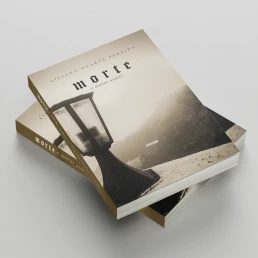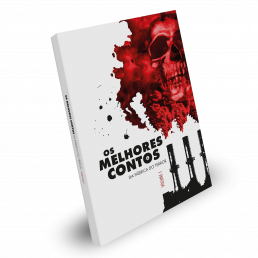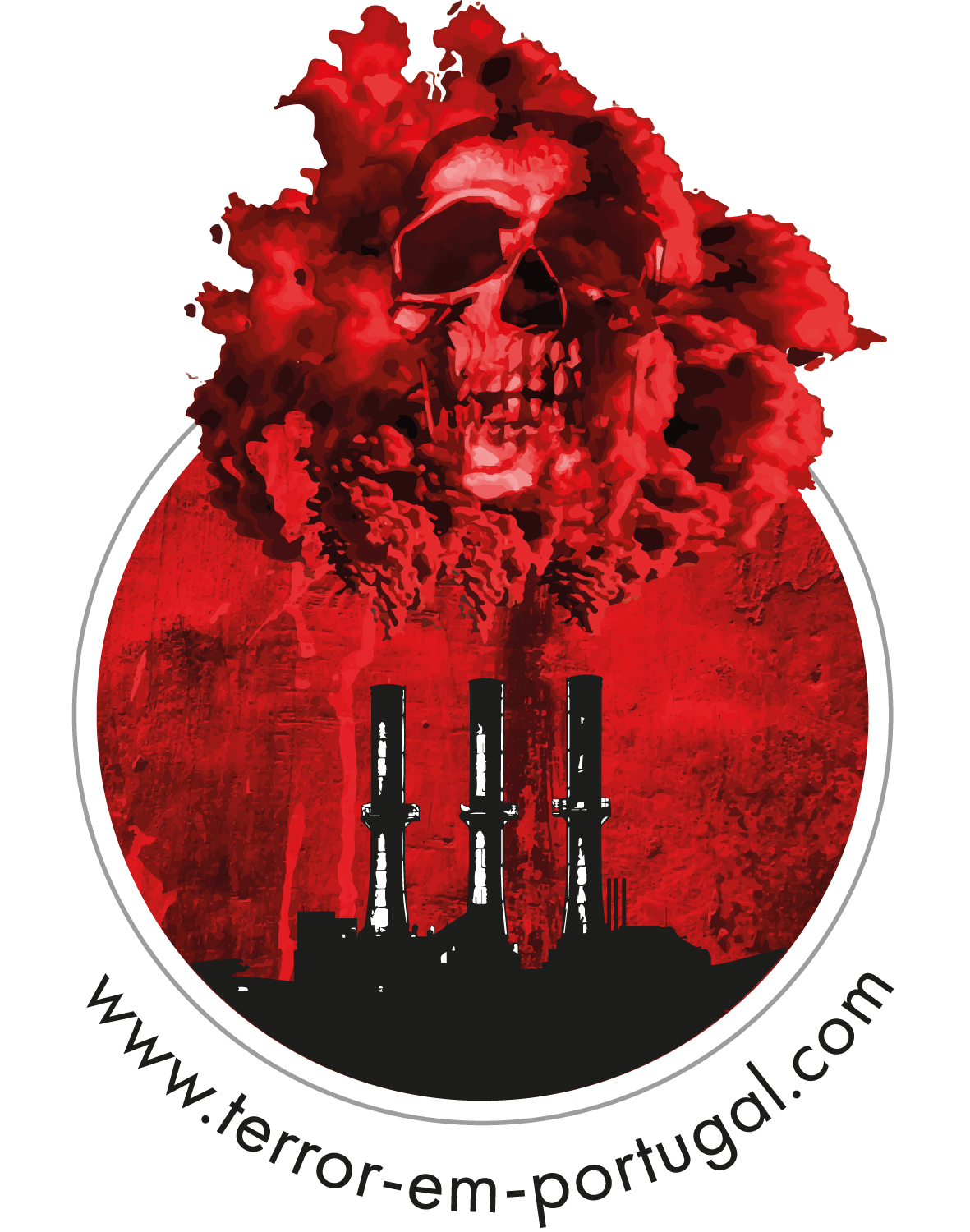Interview with author Miguel Gonçalves
“I think a certain cultural elite still doesn’t consider horror a serious literary genre”
We’re publishing this interview a few days after the official launch of “Devil’s Rejects”, a horror anthology published by Dark Pine Publishing, and Miguel Gonçalves’s authorial debut with the short story “The Scarecrow Man.”
Among other topics, we talked about first times, what’s it like to be a horror writer in Portugal, the community, and the need to produce to consume to produce horror in Portuguese consistently.
An interview from
Os nossos livros estão à venda!
«Morte e Outros Azares»
16.50 € (com IVA)«Os Melhores Contos da Fábrica do Terror – Vol. 1»
16.50 € (com IVA)***
Do you remember when you started enjoying horror?
I remember two separate instances. In the first one, I was watching “Evil Dead” with my parents. I must have been about 5 or 6 years old, my mom was terrified, but I was having a blast, thoroughly enjoying myself. I probably didn’t understand any of it, but that’s my first memory. In the second one, I remember my mom watching “Twin Peaks” and not allowing me to see it, so I would hide behind the living room door and take a peek.
That’s interesting because you were allowed to watch “Evil Dead,” but not “Twin Peaks.”
I think it’s because when “Twin Peaks” came around, I was older, and it’s a different kind of horror, not about monsters and blood. It’s more psychological horror, and I think it makes a difference. It probably affects you more than gore when you’re that young.
When did you discover horror books?
From what I remember, I think I discovered horror books much later. I started reading fantasy books, and, as far as I can tell, my first contact with horror books was probably through Stephen King. Whether you like him or not, how he writes and what he writes about, or how he writes certain characters, I think he was the only international writer we could get our hand on back then [in Portugal]. There weren’t many other international horror books here.
Stephen King was all we could get in the 90s, yes. His translated books were widely available in bookstores.
I think the first Stephen King book I read was “Dark House”, by his pseudonym, Richard Bachman.
Did you know it was him, at the time?
Yes, because the book cover had Stephen King as the author. In fact, it was much later that I found out he was Richard Bachman. After Stephen King, although I don’t think of it as “real” horror, I read Anne Rice. I’m not saying I don’t think what she writes is horror, but…
Now I have to ask you what you call “real” horror.
To me, horror doesn’t have to scare you. It doesn’t have to mean blood or monsters. To me, horror is something that makes you uncomfortable because of a specific situation or a character. What I meant is that I think Anne Rice is considered a horror author because of the vampires, but I don’t see it as a horror story. It’s not [a story like] “The Shining” or “It”; it’s not something that scares you or makes you feel uncomfortable. And Anne Rice is probably one of my favorite writers, and I see her as a horror author, but I don’t see it as frightening; it’s more like literary horror. And by this, I don’t mean that horror can’t be literary. But when it comes to what’s “real” horror, maybe I’m so immune to it that I no longer know what it is. I feel that in some movies. If I don’t see the monster or know what’s chasing the person, to me, that’s a lot more interesting — the anticipation of it.
When do you start writing, horror or something else?
I think my experience with writing started before the actual writing, when I used to come up with stories to play with my toys and Legos. I’d do more than just play with them. I’d have a story which I would then pick up where I’d left off. Then, at 11 or 12 years old, I remember writing alternative versions of myths, stuff I used to read and then tried to recreate in my own words. Sometimes, they were different from the original; sometimes, they weren’t. After that, I stopped writing for a while, and around 16 or 17 years old, I began writing again when playing RPGs like Dungeons & Dragons. I used to write stories for my characters and for my games with friends. I still have some of those old stories and I used some parts of them for other stories. I also have loose ideas and half-stories in notebooks, which I say I’ll write properly on a Word doc, so it’s easier to keep track. But I’ll never get around to doing it, and I’ll never have the patience for it.
Some say if you never find the time to develop that idea properly, you’re not as in love with it as you think you are.
I think some stories make sense when you write them at that moment. And then, for many reasons, we have to stop them, and when you return to them, that feeling, that “us” isn’t there anymore. I have a slightly different experience. I started writing a story to submit to an anthology, and I had to stop because it was becoming too personal. I want to continue it and see where it goes, but it was a little out of control. Whenever we write something, even if it’s the most absurd, horrific, gore story, it’s a part of us. And that’s why, maybe, everyone starts with fan fiction, to make that story they love so much become a part of them, too.
Do you feel you’ve already developed a personal style, a signature?
I think one of my telltales is my characters’ descriptions. I think I give them specific details, making it easier for someone to say, “this is a Miguel story”.
Your writing is very cinematic. I don’t know if you’re aware of it. Does your writing process begin with an image?
Yes, and it’s the worst thing that can happen to a writer; it’s awful — having this clear, precise image in your head and not being able to convey what you see in writing.
“The Scarecrow Man“ in “Devil’s Rejects” is your first published story? Is this your debut as a published author?
It’s my first published story. I haven’t published anything else before.
How did you become a part of this anthology?
During the pandemic, I discovered many independent horror authors on Instagram and started following a few of them. Some of us got close, and I found out about these independent horror publishers through them. One of them wanted to put together an anthology of short stories that had been previously rejected. That happened to me. My short story was rejected, so I submitted it to this one, dedicated to second chances, and it was selected.
Do you know why it was rejected the first time?
At the time, the editor told me the story didn’t fit what he was looking for. One of the things I’ve been told the most, especially regarding these anthologies, is to never think that my story is bad or that they didn’t like it, but to think of an anthology as a music record. There’s only room for ten songs, and maybe some songs are good, but they’re omitted because they don’t make sense in the lineup. I only started sharing my work publicly at the end of last year [2021]. No one ever read what I wrote. That was one of the most interesting, practical, and helpful pieces of advice someone has given me. To think that a “no” doesn’t mean the story is bad, that it’s not good enough, or that you can’t write. It simply doesn’t fit into that specific book. And the proof is that my story didn’t make the first book, but was accepted in this one.
Do you always write in English? Except for that short story you submitted to Fábrica (to be published soon).
That short story was initially written in English, and I made some changes when translating it into Portuguese. I think I write mostly in English because I read in English a lot. Subconsciously, maybe it makes more sense for how the story flows and what happens. Even if my vocabulary in English isn’t extensive, I find it easier to manage. Well, and also maybe because, so far, I was under the impression there was no such thing as horror in Portugal. [laughs]
You don’t say! [laughs] But did you feel that?
Especially in writing — books and short stories. I’m not talking about the translated works. The only Portuguese horror writer I knew was David Soares. Because of my connection to Fantasporto, I know there are many horror short films in Portugal, but I couldn’t find much when it came to writing. And maybe it was because many people, like me, thought “horror in Portugal doesn’t exist, so I’ll write in English”.
Exactly. You won’t produce more if you don’t show people it already exists. Produce to consume to produce.
I think a certain cultural elite still doesn’t consider horror a serious literary genre. If I write a horror book, they’ll say, “oh, but that’s not a real book, that’s not literature”. For example, I enjoy comic books and graphic novels, and I’ve read plenty of comic books that are better than many books, but it’s not considered “true literature.” It’s changed over the years, but the stigma still exists with horror.
And some horror books aren’t classified as such because the author fears they won’t take them seriously. There’s a lot of work to do.
I think people see us, horror writers, as people with issues. I wrote a story about a man who creates scarecrows, and people who’ll read it will probably say: “Miguel has issues. Miguel is going around turning people into scarecrows”. [laughs] No one asks Stephen King or other horror authors if they’re normal. When you’re not famous, people always look at you as if you’re weird. “But why do you write about these things? Try to write something nicer. So much blood! Do you have any issues with teenagers to write about killing them? Are you putting those problems in writing, so you don’t act upon them in real life? Is this like therapy?”
Do you feel tired already? Of answering the same questions all the time?
Fortunately, I don’t think it affects me much because of two crucial things. Firstly, my colleagues don’t think like that. Secondly, because few people know I write. My coworkers don’t know I’m also a writer, partly because they’re not on my social media. I like to keep things separate. So I think I don’t feel that a lot yet. But I can tell you that some people have given me the side-eye after reading some of my stuff. [laughs]
It’s not like we go into a dark traumatic corner of our imagination to write a horror story!
It’s something that’s very normal; it happens. We might go there sometimes. Maybe we remember some frustrating event or give a character the exact characteristics of someone we know for whatever reason.
Sometimes observing someone and writing about it suits the story.
Yes. I sometimes imagine the story behind random people I see on the street. And create a story in my head. But, like I was saying, there is still a stigma that horror writers aren’t normal and that there’s no horror in Portugal because no one was writing about it. Even David Soares isn’t one of the best-known Portuguese authors.
However, things would be different if a renowned author started to write horror in Portugal.
That’s the validation from someone famous and with some power in the business.
You’re the only Portuguese author in “Devil’s Rejects”. Do you see it as an accomplishment? Do the editors see it as something special?
I don’t think they saw it as something special. I think they get more submissions from English-speaking countries. But if this had happened 15 or 20 years ago, then maybe yes, it would mean something big, because of how difficult it would have been back then. Now, thanks to the Internet, I think it’s still important that I, a Portuguese author, got my short story accepted into this anthology, with so many writers to have a story that was good enough to be included, which only proves that great work is being done in Portugal. But, with the Internet, I think it doesn’t matter if I’m in Portugal or in the United States. I don’t think it makes a difference to them.
Maybe we still care too much about it. If you’re successful abroad, then you’re good, but if the anthology is a local project, then maybe you’re not such a big deal. It’s about making a name for yourself in another country.
I think that if my first short story had been published in a Portuguese anthology, I would feel the same way, because it would still be my debut as a published author. Maybe what changes here is the future. If I want to publish my anthology with whatever stories I have now, perhaps it’s different for an independent publisher to see that I already published a story in an international anthology instead of a Portuguese one. Maybe it will weigh more than something launched in Portugal. I’ll get more exposure from that.
What’s next for you as an author?
I think I’ll continue to write short stories, because I find it difficult to write more extensive texts. I’m working on a short story to submit to another anthology. Earlier this year [2022], I had plans to launch my anthology before this story for “Devil’s Rejects” was accepted. If submitting to other anthologies doesn’t work, I’ll publish my own. That’s the plan.
In Portuguese or English?
Probably in English, to use the stories I’ve already written. That’s what I’m currently focusing on: continue to write and submit to anthologies. If some of them are accepted, cool; if not, I’ll use them in my anthology with other stories I’ll write. I already have a title and one or two stories I want to include, but it’s still a work in progress. And, who knows, I might even have a double edition, with an English and a Portuguese version.
GOSTASTE? PARTILHA!
Sandra Henriques
Escritora de conteúdos digitais e autora de livros de viagens, Sandra Henriques estreou-se na ficção em 2021, ano em que ganhou o prémio europeu no concurso de microcontos da EACWP com «A Encarregada», uma história de terror contada em 100 palavras. Integrou as antologias «Sangue Novo» (2021), com o conto «Praga», e «Sangue» (2022), com o conto «Equilíbrio». Em março de 2022, cofundou a Fábrica do Terror, onde desempenha a função de editora-chefe.






